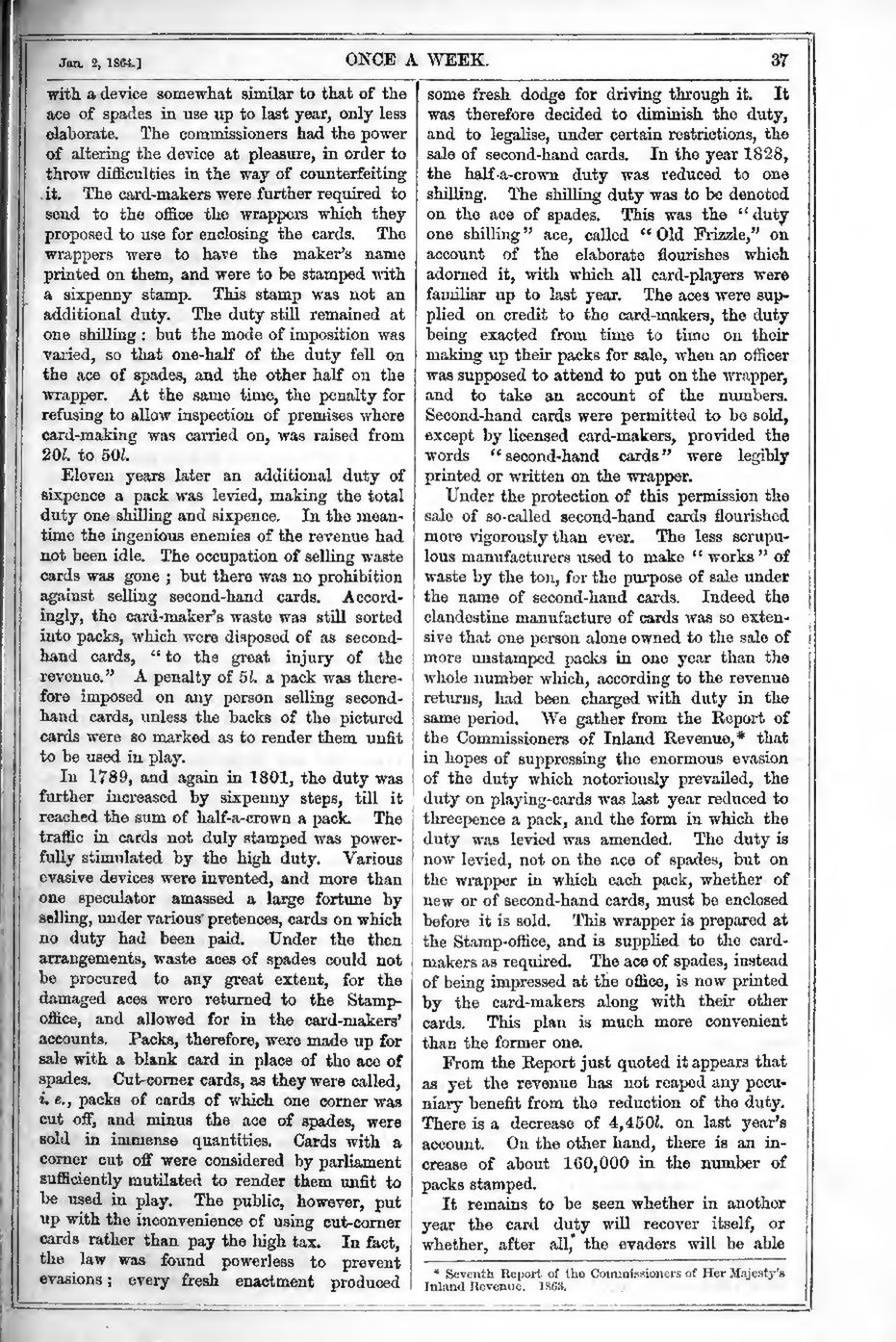Jan.
2,
ONCE A WEEK.
1S64.]
with a device somewhat similar to that of the ace of spades in use up to last year, only less The commissioners had the power elaborate.
37
some fresh dodge for driving through it. It was therefore decided to dimmish the duty, and to legalise, under certain restrictions, the sale of second-hand cards. In the year 1828, the half-a-crown duty was reduced to one The shilling duty was to be denoted shilling. on the ace of spades. This was the " dutyone shilling" ace, called "Old Frizzle," on account of the elaborate nourishes which
of altering the device at pleasure, in order to difficulties in the way of counterfeiting The card-makers were further required to it.
throw
send to the office the wrappers which they The proposed to use for enclosing the cards. wrappers were to have the maker's name printed on them, and were to be stamped with a sixpenny stamp. This stamp was not an The duty still remained at additional duty. one shilling but the mode of imposition was varied, so that one-half of the duty fell on the ace of spades, and the other half on the
adorned
card-players were aces were supplied on credit to the card-makers, the duty being exacted from time to time on their familiar
it,
with which
up to
all
last year.
The
making up their packs for sale, when an officer was supposed to attend to put on the wrapper, and to take an account of the numbers. Second-hand cards were permitted to be sold,
At the same time, the penalty for wrapper. refusing to allow inspection of premises where card-making was earned on, was raised from
except by licensed card-makers, provided the
201. to 50?.
words
Eleven years later an additional duty of sixpence a pack was levied, making the total In the meanduty one shilling and sixpence. time the ingenious enemies of the revenue had not been idle. The occupation of selling cards was gone ; but there was no prohibition Accordagainst selling second-hand cards. ingly, the card-maker's waste was still sorted into packs, which were disposed of as second" to the hand of the
printed or written on the wrapper. Under the protection of this permission the
|
|
i
great injury penalty of 5 J. a pack was therefore imposed on any person selling bo hand cards, unless the backs of the pictured cards were so marked as to render them unfit to be used in play. In 1789, and again in 1801, the duty was further increased by sixpenny steps, till it
reached the
A
sum
of half-a-crown a pack.
and minus the ace of spades, were immense quantities. Cards with a corner cut off were considered by parliament
sold
off,
in
sufficiently mutilated to render be used in play. The public,
them
unfit to
however, put up with the inconvenience of using cut-corner cards rather than pay the In fact, high tax. the law was found powerless to prevent evasio; y fresh enactment produced
more vigorously than
ever.
lous manufacturers used to
legibly
The less scrupumake " works " of
waste by the ton, for the purpose of sale under name of second-hand cards. Indeed the clandestine manufacture of cards was so extensive that one person alone owned to the sale of unstamped packs in one year than the whole number which, according to the revenue the
had been charged with duty in the We gather from the Report of the Commissioners of Inland Revenue,* that in hopes of suppressing the enormous evasion of tho duty which notoriously prevailed, the duty on playing-cards was last year reduced to threepence a pack, and the form in which the The duty is duty was levied was amended. now levied, not on the ace of spades, but on the wrapper in which each pack, whether of new or of second-hand cards, must be enclosed
same
The
,
cut
were
returns,
in cards not
duly stamped was powerVarious fully stimulated by the high duty. evasive devices were invented, and more than one speculator amassed a large fortune by selling, under various pretences, cards on which no duty had been paid. Under the then arrangements, waste aces of spades could not be procured to any great extent, for the damaged aces were returned to the Stampand allowed for in the card-makers' office, accounts. Packs, therefore, were made up for sale with a blank card in place of the ace of Cut-corner cards, as they were called, spades. i. e. packs of cards of which one corner was traffic
cards"
second-hand cards flourished
sale of so-called I
cards,
revenue."
"second-hand
1
period.
This wrapper is prepared at is supplied to the cardmakers as required. The ace of spades, instead of being impressed at the office, is now printed by the card-makers along with their other This plan is much more convenient cards. before
it is sold.
1
nip-office,
and
than the former one.
From the Report just quoted it appears that as yet the revenue has not reaped any pecuniary benefit from tho reduction of the duty. a decrease of 4,450£. on last year's On the other hand, there is an increase of about 160,000 in the number of
There
is
account.
packs stamped. It remains to be seen whether in another year the card duty will recover itself, or whether, after all, the evaders will be able if
Inland Revenue.
I
the Commission
'
'justy's